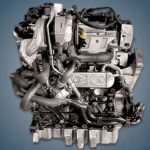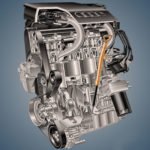The 1.4-liter Volkswagen CHPA 1.4 TSI gasoline engine was produced from 2012 to 2015 and was installed on the seventh Golf, as well as cars on its platform: Octavia A7 and Seat Leon 3. This power unit had a modification equipped with the ACT system under a different CPTA index.
The EA211 series includes: CWVA, CWVB, CJZA, CJZB, CHPA, CMBA, CXSA, CZCA, CZDA, CZEA, DJKA, DACA, DADA.
Specifications
| Production years | 2012-2015 |
| Displacement, cc | 1395 |
| Fuel system | direct injection |
| Power output, hp | 140 |
| Torque output, Nm | 250 |
| Cylinder block | aluminum R4 |
| Block head | aluminum 16v |
| Cylinder bore, mm | 74.5 |
| Piston stroke, mm | 80 |
| Compression ratio | 10.0 |
| Features | DOHC |
| Hydraulic lifters | yes |
| Timing drive | belt |
| Phase regulator | on both shafts |
| Turbocharging | IHI RHF3 |
| Recommended engine oil | 5W-30 |
| Engine oil capacity, liter | 3.8 |
| Fuel type | petrol |
| Euro standards | EURO 5 |
| Fuel consumption, L/100 km (for VW Golf 2013) — city — highway — combined |
6.1 4.4 5.0 |
| Engine lifespan, km | ~240 000 |
| Weight, kg | 106 |
The engine was installed on:
- Skoda Octavia 3 (5E) in 2012 – 2015;
- Seat Leon 3 (5F) in 2012 – 2014;
- Volkswagen Golf 7 (5G) in 2012 – 2014.
Disadvantages of the VW CHPA engine
- In the first place is the problem of the oil burner, especially for engines until 2013;
- This is followed by a breakdown of the thrust of the wastegate actuator due to its souring-jamming;
- Also, often inexperienced craftsmen damage the ignition coils when replacing candles;
- On a run of 100,000 km, an expensive pump with two thermostats often leaks;
- The remaining complaints are associated with a long warm-up and extraneous noise-knocks.






